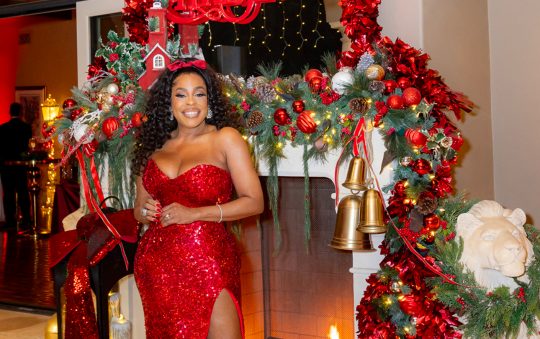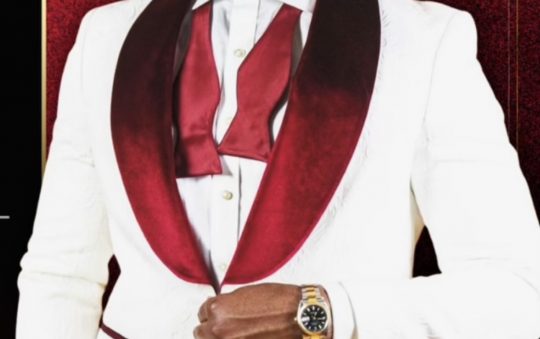
Tony Weaver Jr. shared that he wrote “Weirdo,” a graphic novel memoir about self-love and individuality, because he realized the self-esteem and confidence issues he faced as a child were not just personal struggles but institutional ones.
“When I was a teenager, even when my parents got me mental health support, I still had this negative narrative in my head that said, ‘It was a Tony problem. Tony went to a school, Tony got bullied, Tony struggled with his self-esteem, but then Tony got therapy and now Tony’s better,’” he said. “I thought it was just a me thing.”
However, after working in schools, Weaver saw how widespread these challenges were, especially for Black children. “Since I was privileged enough to make it to the other side of that darkness, it was my responsibility to use my experience to bless other people and support other people on their journeys,” he said.
Published on September 17, 2024, “Weirdo” has received widespread recognition. The book has been named a Best Book of the Year by People Magazine, Publishers Weekly, School Library Journal, The New York Public Library, The Chicago Public Library, and Kirkus.
Related Stories
Soul and R&B Mourn Loss of Roberta Flack, Gwen McCrae and Jerry Butler
Weaver said the success of the book affirmed his belief in the importance of representation.
Weaver chose to write a graphic novel because of his love for the medium and its effectiveness as a literacy tool.
“Not only do graphic novels keep students engaged, but they also have a higher percentage of rare vocabulary words,” he said. “I know for a fact that I’ve got some in there.”
For Weaver, it was just as important that “Weirdo” showed mental health through the lens of a Black child.
“Very rarely is there a character of color, especially a Black character, that’s navigating these things,” he said. “The nuances of what it means to be Black in the United States create an additional layer of struggle for a lot of these mental health conditions.”
He wanted both Black and non-Black readers to connect with the character. “If you’re struggling with mental health, you can empathize and relate to someone that’s different from you via that struggle,” he said.

“But if you are Black, you will see yourself represented and know that it’s a problem you can ask for help with.”
Weaver said “Weirdo 2” would focus on how standardized testing and flawed intelligence assessments could prevent educators from recognizing students’ potential.
” ‘Weirdo 1’ is about how the academic system can negatively impact student mental health,” he said. ” ‘Weirdo 2’ is about how standardized testing and some of the relatively inaccurate ways we gauge student intelligence can cause you to miss out on genius.”
He criticized the education system for allowing students to bear the consequences of poor decisions made by adults.
“Education is one of the only industries where when you make a mistake, you are not the person that has to carry the mistake,” he said. “The kids are going to be dealing with the ramifications of that mistake probably for the rest of their academic careers.”
The sequel, Weaver explained, would encourage children to develop a self-image that was not solely defined by academic evaluations.
When asked about his personal style, Weaver said his clothing choices reflected his commitment to taking up space. He is often seen wearing glasses, a button-down shirt, a tie, and a cape—a look that blends professional polish with superhero flair.
“I spent so much of my life trying to curl up and not be seen,” said Weaver. “Now, in any room I step into, the way that I dress, the way that I carry myself, is rooted in this idea that I deserve to be in these rooms. I worked to be here, and I want to create space for other people who might not be ready to be as expressive yet.”
As the founder of Weird Enough Productions, Weaver made it his mission to create positive representations of Black men and other minority groups in media.
His company, best known for the acclaimed webcomic “The UnCommons,” aims to use storytelling to challenge stereotypes.
He described the industry as heavily relationship-driven, making it difficult for Black creatives to gain access.
“I started Weird Enough when I was 19 years old, and I was at conferences where I’d meet people who were like, ‘Oh, I won a grant from so and so. I went to school with the program manager, so I just called and said, Hey, here’s what I’m interested in doing.’ And they accepted my grant proposal,” said Weaver.

“Whereas for me, if I try to call that person, they’re not going to pick up the phone because they don’t know who I am,” Weaver added.
However, he credited his success to embracing his unique perspective. “Leaning into the things that make me unique—what we call ‘the weird enough way’—has allowed me to chart my own path.”
Weaver turned down a job at NBC Universal to pursue his company full-time, a decision that initially worried his mother. However, he secured an $80,000 investment from the Echoing Green Foundation just before graduation.
Weaver said his business success came from having a clear understanding of his values and competitive advantages.
“I use the same creative mind that I apply to my writing to find creative ways to present our programs, products, and digital tools,” he said.
Weaver’s approach focused on scaling impact. “It’s cool to serve a thousand kids. What does it look like to serve a million?”
When asked about his proudest achievement, Weaver pointed to “Weirdo” and the moment his mother saw its success.
“That look on my mom’s face—that she’s not necessarily worried anymore,” he said. “She’s always going to worry a little bit, but this kind of feeling of approval and understanding that, ‘Okay. He did it. Wild gamble. Oh, my goodness. Wild gamble. But he managed to figure it out.’”
Since its release, he had visited over 45 schools and received letters and artwork from students who connected with his story. “I get to see in real-time the impact this story is having,” he said. “That’s something I value more than any award or title.”
Although based in Atlanta, Weaver expressed plans to expand his work to Los Angeles. He had already collaborated with Crete Academy, a school for students experiencing homelessness, and hoped to embark on a California tour like his East Coast tour.
“We were having conversations with people in L.A., and then the fires happened,” he said. However, he remained committed to bringing his message to new audiences. “It is my goal to do that in Los Angeles.”
In 2018, Weaver became the first comic book writer to be named to Forbes’ 30 Under 30 list.
His recognition as a leader in media and social impact has continued to grow, but for him, the real reward lies in the lives he touches.
“As long as we honor what our values are,” he said, “the path to create the impact that we want to make will present itself.”







